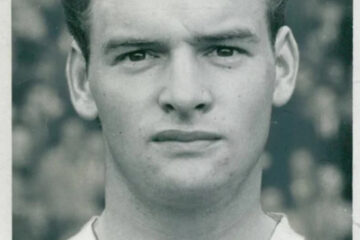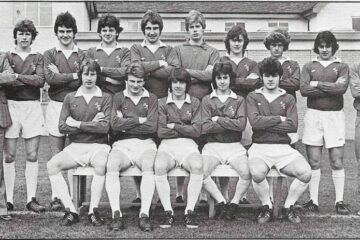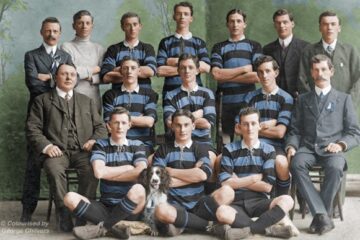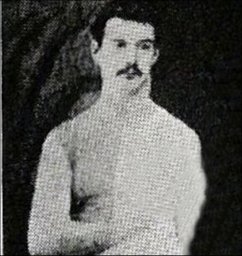
Joseph William Pickering was born in Liverpool on Sunday, 31 August 1856, to parents William and Ellen. William was a paviour, or paver, a layer of stone flags for pavements, etc.
In 1861, the Pickering family were recorded on the national census as living at 26 Horatio Street, off Scotland Road. Joseph had at least five siblings; three older brothers, Thomas, Edward and Robert, and two younger sisters; Caroline and Esther.
Aged 23, on 27 June 1880, Joseph married Hannah Miller at Christ Church Everton, on Great Homer Street, a church which was later destroyed in the May Blitz of 1941. Joseph’s sister Caroline and her husband John Calderwood served as witnesses at the wedding. By the time of the 1881 census, the couple were living at 50 Conway Street, Everton, with a two-week-old son, William.

The first recorded selection of Joe Pickering in an Everton shirt (according to Steve Johnson’s www.evertonresults.com website) was as full-back, on Saturday, 11 November 1882, at the Rhosddu Recreation Ground, in an eventful 3-5 defeat by Wrexham. A week later, Pickering was selected at centre-forward and scored twice in a 4-0 victory over Eagley – a club from Bolton – at Stanley Park, with evergreen early Evertonian Mike Higgins notching the home team’s other goals. Pickering missed the next fixture, a 5-2 win at Birkenhead, before returning to the forward line for a match at Everton’s fiercest local rivals, Bootle, played on the Bootle Cricket Ground in Irlam Road, on Saturday, 2 December 1882, resulting in a two-nil victory for Bootle.
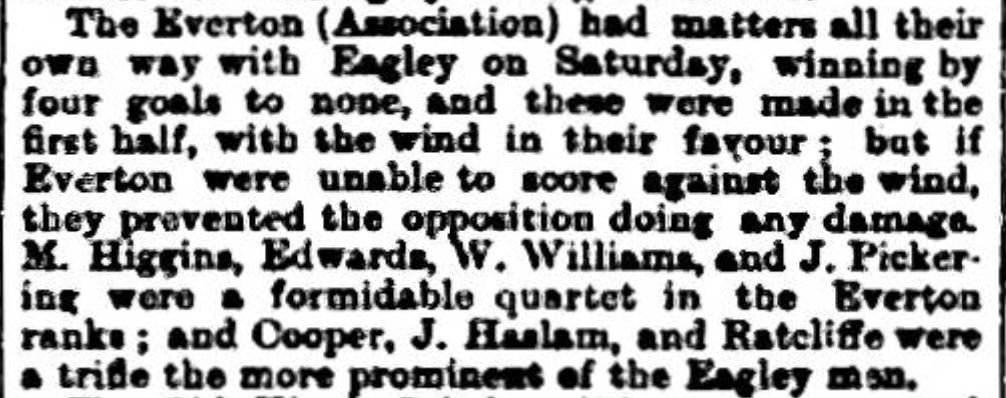
After missing a few more games, Pickering returned, this time on the right wing, for another goal-laden clash, as Everton defeated the Liverpool Association team 8-0 at Walton Stiles, on Saturday, 13 January 1883, in a Liverpool Senior Cup first round clash. He scored again that day, and retained his place in the team the following weekend, this time playing at inside-right in the return match versus Bootle, who again won the day, beating Everton in a close-fought contest by one goal to nil.
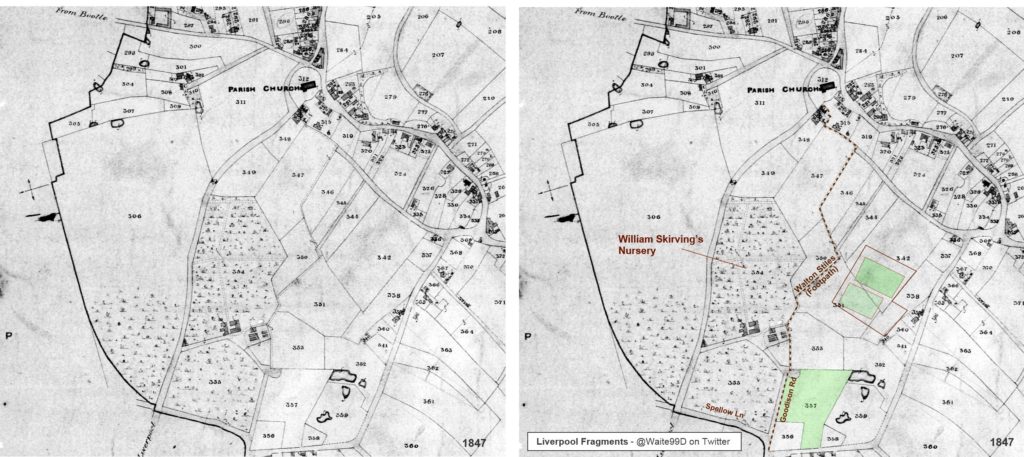
Turton, a club from the Lancashire moors, welcomed Everton, who had been struggling all season to find a regular goalkeeper, for a friendly on Saturday, 10 February 1883, and Joe Pickering again demonstrated his versatility, turning out this time at half-back. In his only known Everton appearance, a man by the name of E. Richards filled in between the sticks that afternoon, becoming at least Everton’s sixth different custodian of the campaign (Frank Brettell, club secretary, and primarily an outfield player, had covered in goal on several occasions). A sombre Everton party trooped home to Liverpool off the back of a demoralising 7-0 defeat.
The Everton players dusted themselves down, and, a week later, with Joe Pickering back at full-back alongside club stalwart R.W. Morris, thrashed Liverpool Rovers 6-0 in the Liverpool Senior Cup quarter-final at Stanley Park.
After another short absence from the side, Joe Pickering returned at full-back for Everton’s trip to Oswestry on Saturday, 24 March 1883. Oswestry had managed a 2-0 win at Stanley Park a fortnight earlier, and triumphed again in the return fixture, trouncing Everton 5-2, with one George Farmer among their goal scorers.
Frank Brettell again donned the goalkeeper’s jersey and Joe Pickering lined up at full-back a week later as Bootle sent Everton’s Liverpool Senior Cup dreams tumbling with a 3-1 win on the Liverpool College Ground at Fairfield. Pickering made one more recorded appearance that season as Everton, in a welcome improvement on the humbling in the away fixture, held Turton to a 1-1 draw at Stanley Park, with Pickering this time playing at half-back.
1882/83 – Joe Pickering’s debut season as an Everton player – ended with him having made eight friendly appearances, scoring three goals, plus a further one goal in three Liverpool Senior Cup ties.
Pickering missed only three matches the following season, managing a further 14 friendly appearances, primarily at half-back, with the occasional venture forward to inside-right, or back at full-back, throughout 1883/84. He also managed four Liverpool Senior Cup appearances, playing in every round as Everton won the trophy for the first time, defeating Earlestown by one goal to nil in the final at Bootle’s Hawthorne Road ground on Saturday, 29 March 1884.
Only Mike Higgins would make more appearances for Everton during the 1884/85 season, as Everton moved things up a gear and ended the campaign with new recruits George Farmer and George Dobson about to make history by signing the first professional playing contracts in the club’s short history.
Pickering missed Everton’s opening two fixtures, heavy defeats at Burslem, then Wallasey and District, but returned at full-back alongside Jack McGill for a much needed 5-0 win over Earlestown – Everton’s first match at their new Anfield home – on Saturday, 27 September 1884. Pickering’s first goal of the season came in a 7-0 home win over Toxteth Wanderers a month later. Everton’s good form continued, with Pickering occupying his familiar half-back position, up until he scored his side’s goal in a 1-1 draw versus Darwen Old Wanderers, at Anfield, on Saturday, 17 January 1885.
A week later, Everton welcomed Liverpool Cambrian to Anfield and lost by the odd goal in seven. Ever the team player, Mr. Versatile himself, Joe Pickering made his goalkeeping debut that afternoon. The position clearly remained a pressing issue for the Evertonian selection committee. Charlie Lindsay, Everton’s most consistent custodian in that era, returned the following week, with Pickering back at half-back and a sense of normality restored, as Everton gained revenge over Bootle, winning the sides’ Liverpool Senior Cup quarter-final by two goals to one after extra-time.
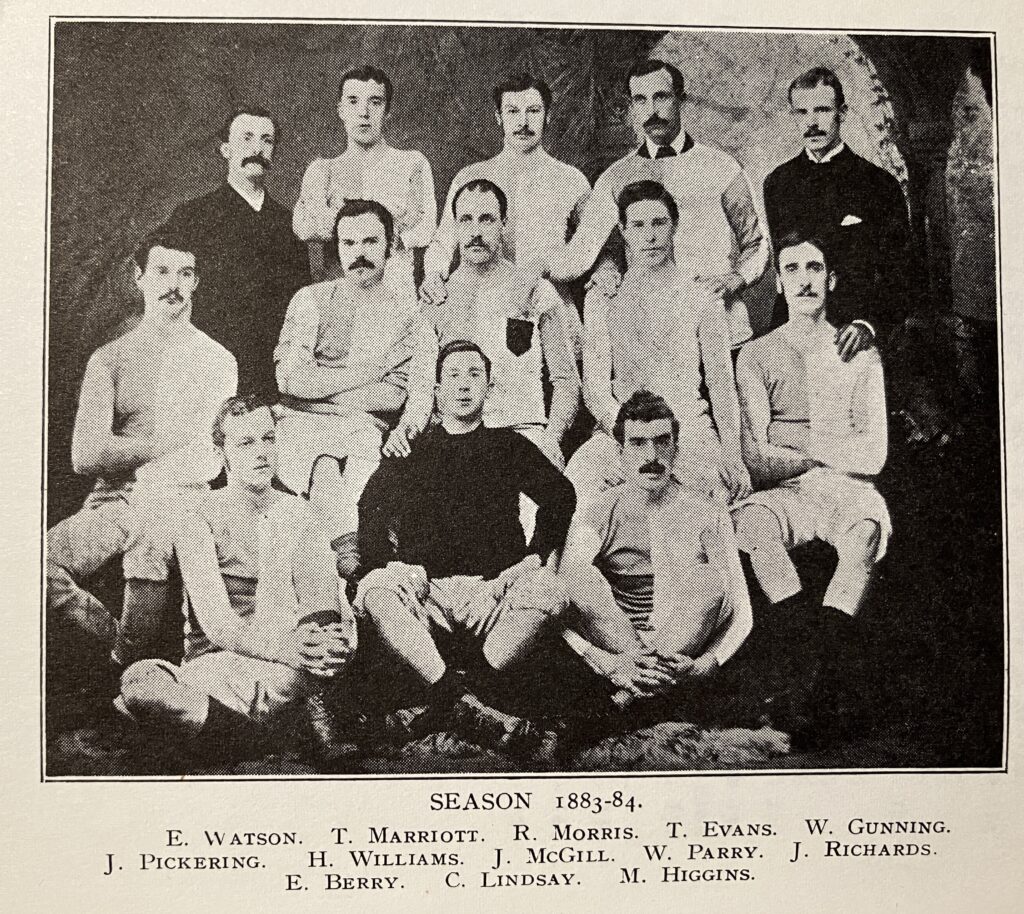
Earlestown gained revenge of their own on Saturday, 28 February 1884, beating Everton 1-0, with Joe Pickering in the half-back line at Hawthorne Road in that season’s Liverpool Senior Cup final tie. Pickering played out the season primarily at half-back, scoring a goal in George Farmer’s first Everton appearance, at Crewe, in April, and two more in a home match versus a Liverpool District Select XI in the penultimate game of the season. He ended the campaign having made a total of 32 appearances, scoring five goals.
1885/86 was Joe Pickering’s last as a footballer. By now approaching 30 years of age, he made 13 appearances, but these were not free of drama, as Everton’s goal-keeping woes continued. First choices, the Charleses, Lindsay and Joliffe, were both unavailable for periods, and the dependable Joe Pickering stepped in once again.
After playing at half-back in an opening day 2-4 home defeat versus Burnley, on Saturday, 15 August 1885, Pickering assumed goalkeeping duties for the next five matches, all at home. Everton lost three of these games, drew one and beat Bootle 2-0 in their only win of a poor run at the start of the season. Pickering returned to half-back for a resounding 8-1 win over Adlington in the Lancashire Junior Cup, at Anfield, on Saturday, 26 September 1885, before missing several matches. He returned at full-back on Saturday, 14 November 1885 for a 0-4 defeat at Welsh club Druids’ Wynnstay Estate ground in Ruabon, partnering new club skipper George Dobson.
Joe Pickering’s last few matches included a 1-0 Christmas Day 1885 win over local rivals Stanley at Anfield and a 2-2 draw against Irish visitors Ulster FC the following day. A week later he played in the New Year’s Day friendly against Glasgow side Partick Thistle at Anfield, the Scots returning north with a 3-0 win in the bag.
After a few weeks out of the side, Pickering came in at half-back for a trip to Southport to face High Park at their Devonshire Road ground, Everton winning 2-1 on Saturday, 27 February 1886. This would prove to be Joe Pickering’s final appearance in an Everton jersey.
Everton went on to win both the Liverpool Senior Cup and the Liverpool Association Shield at the end of the season, with victories in both finals over old foes Bootle, but Joe Pickering’s Everton career was done and dusted by then. He ended his footballing adventure in those pre-Football League days with figures of at least 73 appearances and nine goals for Everton, having filled virtually every position on the pitch in those formative years of the Association game.
Joseph and Hannah Pickering already had three children by the time the 1885/86 football season was completed, sons William and Richard and daughter Susannah. On 30 September 1887, Hannah gave birth to a third son, Joseph William Pickering, junior, in Liverpool, but major change was afoot for the Pickering household.
By the time Joseph William junior was born back home in Liverpool, Joseph, senior, had already taken the bold move to seek his fortune across the Atlantic Ocean, signing paperwork in order to become a resident of the United States of America, in New York on 23 May 1887. Following in his own father’s footsteps, working with stone and clay, Joseph was a bricklayer by trade and would not have been short of work as New York City and surrounding suburbs expanded exponentially around the turn of the century.
The United States Census for the year 1892 recorded the Pickering family, Joseph, Hannah and children William, Richard, Susannah, and Joseph, junior, living together in the Queens borough of Long Island City. By 1900, three more children had arrived, sons Albert, Edward and daughter Nellie (Ellen). The Pickerings lived at 53, 3rd Avenue in Queens and another daughter, Hannah arrived later that year to complete the family.
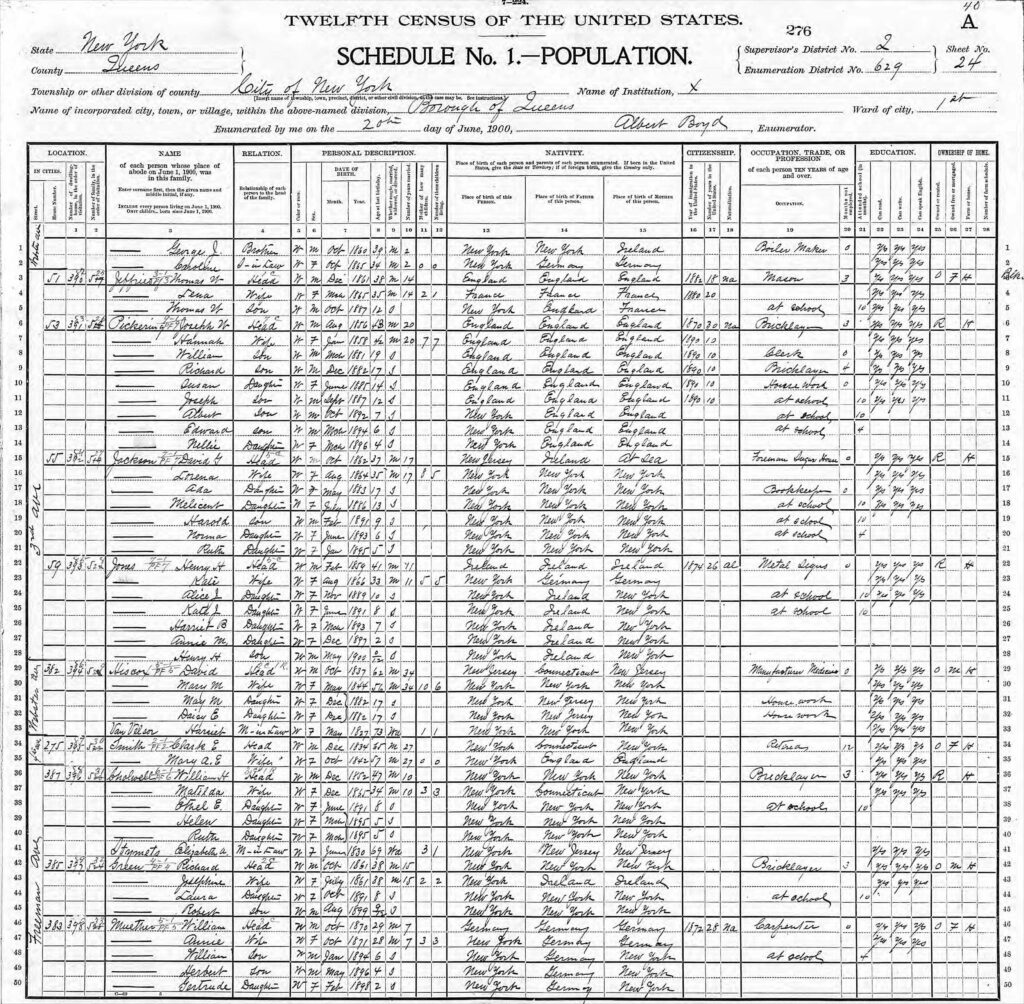
By 1915, the Pickering family had settled in Edgewater, a town in Bergen County on the banks of the Hudson River, just south of the George Washington Bridge in the state of New Jersey. Joseph continued to work as a bricklayer. At the time of the 1920 Census, Joseph and Hannah were living at 372 Undercliff Avenue in Edgewater, New Jersey, with daughter Hannah, sharing the house with Hannah’s older sister Ellen, her husband George Hacker, a chauffer, and their young son, George, junior. This record details that Hannah Pickering did not emigrate to the United States until 1890, three years after her husband and reveals that Joseph became a naturalized United States citizen in 1894.
The 1930 Census records Joseph and Hannah living with their daughter Susannah, her husband, Edgewater Police Department Chief Frank Joret, and their young family, at 45 Edgewater Road, in Edgewater, New Jersey.
On 17 November 1934, the following appeared in the Bergen Evening Record newspaper. Bergen County is situated to the northeast of the state of New Jersey, north of Newark and across the Hudson River from Manhatten and the northern suburbs of New York City:
J. W. PICKERING IS DEAD AT 78
Kin of Edgewater Police Head
Invalid 2 Years
Joseph W. Pickering, Sr., 78, father of Lieutenant Edward Pickering and father-in-law of Chief Frank Joret, of the Edgewater police department, died yesterday at the home of his son, Albert, 298 Howland Avenue, Englewood.
Mr. Pickering, who has been an invalid for two years, was born in Liverpool, England. He came to the United States as a young man and has resided for the greater part of his life in Edgewater where up until 10 years ago, he had followed his trade as a stone mason.
He is survived by his wife, the former Miss Hannah Miller, three sons, Edward, Albert and Joseph, three daughters, Mrs. Frank Joret, of Edgewater, Mrs. A. H. DeWitt, of Nutley, and Mrs. George Hecker, of Montvale, ten grandchildren and one great-grandchild.
Funeral services will be held tomorrow afternoon at 2:30 in the chapel of the New York and New Jersey Crematory, Hudson Boulevard, North Bergen. The Rev. Donald Campbell, pastor of the Park Ridge Methodist Episcopal Church, will officiate.
The cortege will leave the Greenleaf funeral parlors, 108 West Palisade Avenue, Englewood, at 2 o’ clock.’
——————————————————–
Liverpool born Everton footballer, Joseph Pickering was possibly the first ex-Everton player to set up home across the Atlantic.

